If you’re eyeing the digital marketing scene, know that every click tells a story, and every strategy can turn the tables for companies fighting for the online spotlight. Creativity meets metrics, and social media is a place to make connections that matter and spread the word about your brand or make it so that the word spreads on its own. Here is how to become a digital marketing specialist.
Understanding the Role of a Digital Marketing Specialist
Imagine being the person for everything online in a business. That’s more or less what a digital marketing specialist does.
They handle everything from making a website appear at the top of search results (thanks to SEO) to crafting the kind of content that makes people click, share, and buy. Specialists know what makes audiences tick on social media and keep up with the latest hashtag trends to figure out the best time to post. They don’t throw content out into the void and hope for the best—they analyze everything.
Which tweet has the most engagement? Did changing the call-to-action on that email campaign increase conversions? It’s all in a day’s work.
But what’s the big deal about all this, you might ask.
Being visible online is pretty much everything for a business these days. It matters little if it’s a local bakery or a multinational tech company. They all need to be online so potential customers can find them. Their digital marketing specialist uses a mix of creativity, analytics, and tech-savvy to boost brand awareness, rake in leads, and ultimately, drive sales. These specialists are the ones making sure a business is actively connecting with people and turning them into customers.
Essential Skills and Qualifications
To become a digital marketing specialist, you must have strong technical skills, creativity, and a fair bit of analytical prowess. Here’s a rundown:
- SEO/SEM reveals the alchemy of search engines that can make or break a brand’s online visibility. This skill helps you know the right keywords, the magic of backlinks, and the techniques of ranking higher.
- Content creation (blogs that tell a story, videos that captivate, or tweets that go viral) must resonate with your audience.
- Data analysis is great if you love numbers because dissecting website traffic, engagement rates, and conversion stats to understand what’s working (and what’s not) is a big part of the game.
- Social media expertise means knowing your TikToks from your Tweets. Each platform operates on a distinct system, and mastering these can help you connect with audiences effectively.
- PPC advertising is just as significant. Crafting the ads at the top of the search results requires a keen understanding of PPC strategies, especially if you’re aiming for a monetary balance.
As for the educational backdrop, while you don’t necessarily need a degree in digital marketing, having one in related fields like marketing, communications, or business can give you a solid foundation. That said, digital marketing values skills and real-world experience just as much, if not more.
Check out OPIT degrees
-
Career aligned
-
Fully Online
-
EU-accredited institution
Path to Becoming a Digital Marketing Specialist
Here’s a guide on how to be a digital marketing specialist:
1. Obtain a Relevant Degree
While you don’t need a degree in marketing to break into digital marketing, it undoubtedly helps. A bachelor’s in marketing, communications, or a related field lays a solid foundation. It introduces you to marketing principles, consumer behavior, and, increasingly, digital marketing basics. If college isn’t your path, there are still many success stories from self-taught specialists.
2. Get Hands-on Experience
There’s no substitute for getting directly involved in digital marketing. Internships are a great step, as they give you a peek into the industry’s workings and let you apply what you’ve learned. Or you can start your own project. Create a blog, manage social media for a family business, or run your own PPC campaigns to build a portfolio that showcases your skills.
3. Prioritize Continuous Learning
Digital marketing evolves fast, so you must keep up with the trends. Online courses and certifications can keep you up to date while also boosting your resume. Certifications like Google Ads, Facebook Blueprint, or SEMrush certifications also prove your skills and dedication to the craft. Each one is a step toward establishing your expertise.
4. Start Networking
Join digital marketing forums, attend webinars, and don’t be shy about reaching out to professionals you admire. The digital marketing community is surprisingly welcoming and a treasure trove of insights and opportunities.
5. Apply for Entry-Level Positions
With some education, a portfolio, and a few certifications under your belt, start applying for entry-level positions. Adjust your resume to highlight your digital marketing skills and projects, and don’t get discouraged by setbacks. Every interview, whether successful or not, is a point of learning.
OPIT’s Digital Marketing Education Programs
OPIT has a couple of solid programs up its sleeve for digital marketing—the BSc and MSc in Digital Business. They aren’t typical, dry lecture-based courses. These programs give you both the theory and practice necessary in digital marketing.
OPIT’s approach is unique in the way it blends theory with practice. You learn the latest trends, tools, and strategies currently being used in the industry. Plus, you’re not learning in a vacuum. OPIT connects you with industry experts, giving you a chance to pick the brains of people who have invaluable experience and skills. The programs offer first-hand insights, resources, and a network of professionals you’d be hard-pressed to find anywhere else.
Check out OPIT degrees
-
Career aligned
-
Fully Online
-
EU-accredited institution
Why Choose a Career as a Digital Marketing Specialist
For starters, every business out there, from the hole-in-the-wall coffee shop to giant corporations, is trying to make its mark online. That means there’s an enormous demand for people who can handle the digital world creatively and effectively.
This job also keeps you on your toes. One day, you might be cracking the code on a Google Ads campaign, and the next, you’re storytelling on Instagram or analyzing website traffic. It’s this mix of creativity, strategy, and analytics that makes the work diverse and, believe it or not, pretty exciting.
Become the Social Media Strategist You Were Meant to Be
The path to becoming a specialist is fairly varied, but two factors hold true: you need to keep on top of current trends, and you need hands-on experience. Fortunately, OPIT positions you on the right career path by providing just that. Check out OPIT’s bachelor’s and master’s programs in digital business and learn how to be a good digital marketing specialist first-hand.






